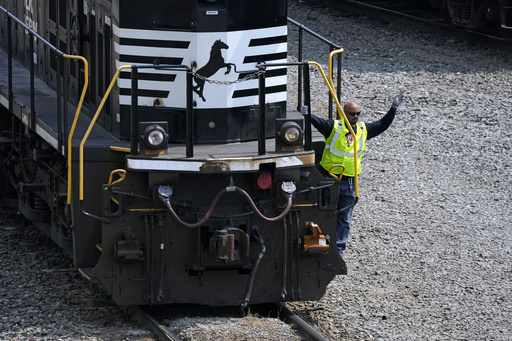Norfolk Southern got a boost during the second quarter from insurance payments related to last year’s disastrous East Palestine derailment, but it also made progress in reducing its expenses and getting more efficient.
The Atlanta-based railroad said it earned $737 million, or $3.25 per share, in the quarter, but there were several unusual factors influencing the results. And last year’s $356 million profit, or $1.56 per share, was heavily weighed down by costs related to the derailment near the Ohio-Pennsylvania border.
But CEO Alan Shaw is most proud of the $250 million in productivity and safety gains the railroad has made this year. Norfolk Southern also hauled 5% more freight during the quarter thanks to the efficiency and new business it was able to attract.
“I’m really encouraged by our progress and I’m really confident in our future,” Shaw said. “We did everything we said we were going to do.”
The $156 million in insurance payments the railroad received as it recovered some of the more than $1.7 billion it has spent in response to the February 2023 derailment in eastern Ohio more than offset the $91 million in costs this quarter. That resulted in a $65 million net boost to earnings. Much of the derailment costs, including the $600 million class action settlement the railroad agreed to this spring, will likely eventually be covered by the railroad’s insurance.
Further complicating the financial picture is the fact that Norfolk Southern spent $22 million in the quarter to fight back against investor Ancora Holdings’ campaign to take over the board and fire the railroad’s management. Ancora’s nominees ultimately won three board seats, but not enough to take control.
Without any of those unusual factors, Norfolk Southern estimated that it would have earned $694 million, or $3.06 per share, in the quarter. The analysts surveyed by FactSet Research expected the railroad to report earnings per share of $2.86.
Its stock rose almost 7% in after-hours after the earnings report came out.
Norfolk Southern endorsed all of the recommendations the National Transportation Safety Board made in its final East Palestine report, and the railroad said it has largely addressed the safety concerns the Federal Railroad Administration raised in a report last year. But the rail industry has been lobbying against many of the proposed regulations Congress has been considering.
During the proxy fight, Shaw hired a new operations chief and promised to make the railroad more efficient, though he still says he doesn’t want to cut so deep that Norfolk Southern won’t have the resources it needs to handle additional freight when the economy does improve.
The railroad said has already parked more than 320 locomotives and pulled some 7,000 cars off its network as it moved to run fewer but longer trains to handle the same freight without as many engines or crews.
Over the next two years, Norfolk Southern predicts will improve productivity by about $550 million and boost its profit margin.
Already, the railroad reported improvement in every single performance metric in its quarterly report Thursday with everything from the average velocity of its cars to the amount of time trains spend in railyards getting better.
Edward Jones analyst Jeff Windau said Norfolk Southern has been steadily improving its efficiency and “put together a really solid quarter.”
The railroad’s revenue grew 2% to $3.04 billion in the quarter, in line with Wall Street’s forecast.
Norfolk Southern is one of the nation’s largest railroads operating trains across the eastern United States.
This website uses cookies so that we can provide you with the best user experience possible. Cookie information is stored in your browser and performs functions such as recognising you when you return to our website and helping our team to understand which sections of the website you find most interesting and useful.
